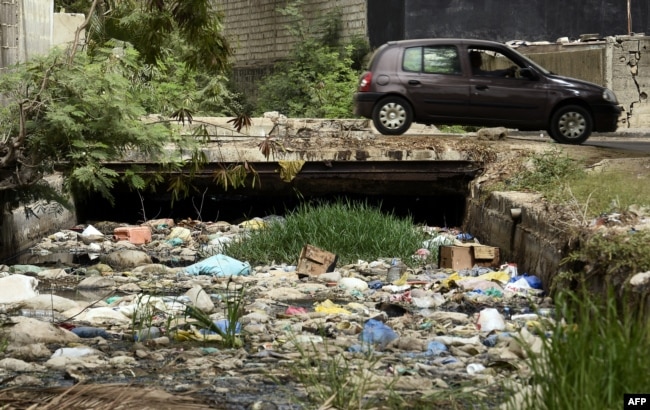Rapid Urbanization Presents New Problems for Africa
In sub-Saharan Africa, the urban population has doubled since the mid-1990s, and reached 400 million people in 2016. According to experts, 40 percent of the region's total population resides in cities, compared to 31 percent in 2000.
During the next 15 years, the United Nations predicts the world's 10 fastest-growing cities will be in Africa.
However, the development of infrastructure and industries has not kept pace with the growth in urban population.
Sixty percent of city dwellers in sub-Saharan Africa live in slums, and only 25 percent have access to safe drinking water.

FILE - A car passes by a canal full with trash in Dakar, June 2, 2018.
Poor sewage systems and weak flood control present another challenge.
Kouman Kossia Tamia, a traditional queen from Ivory Coast, fears the floods that come with each rainy season. When the rainy season comes, she said, she cannot do anything because everything is blocked.
Amadou Diarra, mayor of North Pikine, a suburb of Senegal's capital, Dakar, sees human waste management as a growing problem.
Waste is buried, he said, because there are not plants to deal with it. Instead, there is only one site that receives all the household waste in the Dakar region. The challenge in moving toward sustainability, he said, is to transform waste next to where it is produced, rather than bury it underground.
Most of Africa's urban growth is in small and mid-sized cities, with slightly more than half of African urban dwellers living in cities with populations of less than 250,000.
Maggie Chazal, founder of the NGO Urbanists Without Borders, said these intermediate cities are important to Africa's future because they help connect large cities and rural areas. Without them, she added, rural areas have neither equipment nor jobs, which would lead to an intensifying rural exodus by young people. She says large cities only concentrate economic and social problems, such as slums.
But Africa already has many large cities, and those cities are getting larger. Lagos, in Nigeria, is projected to become the largest city in the world, with an estimated population of 88.3 million people by the year 2100, according to the World Economic Forum.
VOA
AFEEF:
Hadhwanaagnews marnaba masuul kama aha Aragtida dadka kale. Qoraaga ayaa xumaanteeda, xushmadeeda iyo xilkeeda sida. waxa kaliya oo Hadhwanaagmedia dhiirigalinaysaa, isdhaafsiga aragtida, canaanta gacaliyo talo wadaagga!




 0
0 






